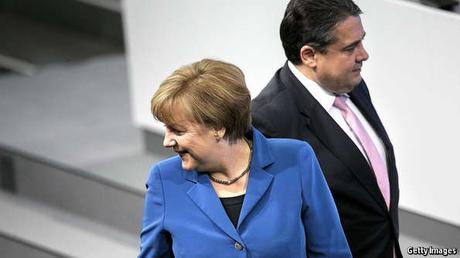
GERMANY may be emerging as Europe’s chief actor on the global stage. But its domestic politics are stuck in a strange logjam, leaving all the main parties, including the partners in the ruling right-left coalition, wondering how to break it.
Eighteen months after the most recent federal election, all parties in the Bundestag stand almost exactly where they were on the night of the polls. This absence of movement is unprecedented in German politics, says Manfred Güllner at Forsa, a pollster in Berlin. The rating of the centre-right Christian Democrats, led by Chancellor Angela Merkel, and their Bavarian sister party, the Christian Social Union (CSU), is very close to the 41.5% they got in 2013. Meanwhile the centre-left Social Democrats (SPD), the junior partners in the “grand coalition”, are stuck near their tally of 25%. And the two small opposition parties, the Left and the Greens, have barely moved, despite the small rise of the anti-euro Alternative for Germany.
For the SPD, in particular, all this is both surprising and frustrating. After the 2013 election they exacted huge concessions, captured in a 134-page coalition contract,…

